|
|
|
Sort Order |
|
|
|
Items / Page
|
|
|
|
|
|
|
| Srl | Item |
| 1 |
ID:
127787
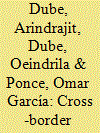

|
|
|
|
|
| Publication |
2013.
|
| Summary/Abstract |
To what extent, and under what conditions, does access to arms fuel violent crime? To answer this question, we exploit a unique natural experiment: the 2004 expiration of the U.S. Federal Assault Weapons Ban exerted a spillover on gun supply in Mexican municipios near Texas, Arizona, and New Mexico, but not near California, which retained a pre-existing state-level ban. We find first that Mexican municipios located closer to the non-California border states experienced differential increases in homicides, gun-related homicides, and crime gun seizures after 2004. Second, the magnitude of this effect is contingent on political factors related to Mexico's democratic transition. Killings increased disproportionately in municipios where local elections had become more competitive prior to 2004, with the largest differentials emerging in high narco-trafficking areas. Our findings suggest that competition undermined informal agreements between drug cartels and entrenched local governments, highlighting the role of political conditions in mediating the gun-crime relationship.
|
|
|
|
|
|
|
|
|
|
|
|
|
|
|
|
| 2 |
ID:
127820
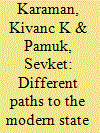

|
|
|
|
|
| Publication |
2013.
|
| Summary/Abstract |
Theoretical work on taxation and state-building borrows heavily from early modern European experience. While a number of European states increased centralized tax revenues during this period, for others revenues stagnated or even declined and these variations have motivated alternative arguments for the determinants of fiscal and state capacity. This study reviews the arguments concerning the three determinants that have received most attention, namely warfare, economic structure, and political regime, and tests them by making use of a new and comprehensive tax revenue dataset. Our main finding is that these three determinants worked in interaction with each other. Specifically, when under pressure of war, it was representative regimes in more urbanized-commercial economies and authoritarian regimes in more rural-agrarian economies that tended to better aggregate domestic interests towards state-building.
|
|
|
|
|
|
|
|
|
|
|
|
|
|
|
|
| 3 |
ID:
127792
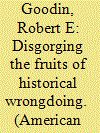

|
|
|
|
|
| Publication |
2013.
|
| Summary/Abstract |
There are many different ways of responding to wrongdoing: person-centered or object-centered, victim-centered or perpetrator-centered, and fault-oriented or not. Among these approaches, requiring innocent beneficiaries to disgorge the fruits of historical wrongdoings of others is attractive because it is informationally the least demanding. Although that approach is perhaps not ideal, at least it is feasible where other responses are not, and doing something is better than doing nothing in response to grievous historical wrongdoing. Depending on circumstances, disgorgement can be in whole or in part, in kind or in cash. Even without the full information that disgorgement itself requires, general redistributive taxation might be justified as a tolerably close approximation.
|
|
|
|
|
|
|
|
|
|
|
|
|
|
|
|
| 4 |
ID:
127807
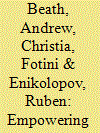

|
|
|
|
|
| Publication |
2013.
|
| Summary/Abstract |
In societies with widespread gender discrimination, development programs with gender quotas are considered a way to improve women's economic, political, and social status. Using a randomized field experiment across 500 Afghan villages, we examine the effects of a development program that mandates female participation. We find that even in a highly conservative context like Afghanistan, such initiatives improve outcomes specific to female participation in some economic, social, and political activities, including increased mobility and income generation. They, however, produce no change in more entrenched female roles linked to family decision-making or in attitudes toward the general role of women in society.
|
|
|
|
|
|
|
|
|
|
|
|
|
|
|
|
| 5 |
ID:
127791
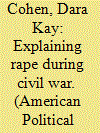

|
|
|
|
|
| Publication |
2014.
|
| Summary/Abstract |
Why do some armed groups commit massive wartime rape, whereas others never do? Using an original dataset, I describe the substantial variation in rape by armed actors during recent civil wars and test a series of competing causal explanations. I find evidence that the recruitment mechanism is associated with the occurrence of wartime rape. Specifically, the findings support an argument about wartime rape as a method of socialization, in which armed groups that recruit by force-through abduction or pressganging-use rape to create unit cohesion. State weakness and insurgent contraband funding are also associated with increased wartime rape by rebel groups. I examine observable implications of the argument in a brief case study of the Sierra Leone civil war. The results challenge common explanations for wartime rape, with important implications for scholars and policy makers.
|
|
|
|
|
|
|
|
|
|
|
|
|
|
|
|
| 6 |
ID:
127818
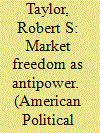

|
|
|
|
|
| Publication |
2013.
|
| Summary/Abstract |
Historically, republicans were of different minds about markets: some, such as Rousseau, reviled them, while others, like Adam Smith, praised them. The recent republican resurgence has revived this issue. Classical liberals such as Gerald Gaus contend that neorepublicanism is inherently hostile to markets, while neorepublicans like Richard Dagger and Philip Pettit reject this characterization-though with less enthusiasm than one might expect. I argue here that the right republican attitude toward competitive markets is celebratory rather than acquiescent and that republicanism demands such markets for the same reason it requires the rule of law: because both are essential institutions for protecting individuals from arbitrary interference. I reveal how competition restrains-and in the limit, even eradicates-market power and thereby helps us realize "market freedom," i.e., freedom as nondomination in the context of economic exchange. Finally, I show that such freedom necessitates "Anglo-Nordic" economic policies
|
|
|
|
|
|
|
|
|
|
|
|
|
|
|
|
| 7 |
ID:
127793
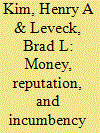

|
|
|
|
|
| Publication |
2013.
|
| Summary/Abstract |
Since 1972, campaign spending by House incumbents has skyrocketed, particularly in those districts with marginal support for the incumbent's party. At the same time, parties in the House have become much more cohesive in the way they vote, producing more precise and informative party brands. We argue that these two phenomena are fundamentally linked. As parties have developed more precise reputations, incumbents in these districts must spend much more to attract voters in "marginal" districts, who would be willing to vote for a candidate with the particular incumbent's legislative record, but not the average member of his party. Increasingly precise party reputations provide voters with stronger priors that incumbents are just like the rest of their party, and incumbents in marginal districts must spend more to overcome these beliefs. We demonstrate this using a simple formal model and test it empirically using campaign-spending data from 1972 to 2008.
|
|
|
|
|
|
|
|
|
|
|
|
|
|
|
|
| 8 |
ID:
127788
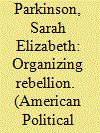

|
|
|
|
|
| Publication |
2014.
|
| Summary/Abstract |
Research on violent mobilization broadly emphasizes who joins rebellions and why, but neglects to explain the timing or nature of participation. Support and logistical apparatuses play critical roles in sustaining armed conflict, but scholars have not explained role differentiation within militant organizations or accounted for the structures, processes, and practices that produce discrete categories of fighters, soldiers, and staff. Extant theories consequently conflate mobilization and participation in rebel organizations with frontline combat. This article argues that, to understand wartime mobilization and organizational resilience, scholars must situate militants in their organizational and social context. By tracing the emergence and evolution of female-dominated clandestine supply, financial, and information networks in 1980s Lebanon, it demonstrates that mobilization pathways and organizational subdivisions emerge from the systematic overlap between formal militant hierarchies and quotidian social networks. In doing so, this article elucidates the nuanced relationship between social structure, militant organizations, and sustained rebellion.
|
|
|
|
|
|
|
|
|
|
|
|
|
|
|
|
| 9 |
ID:
127816
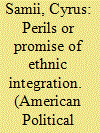

|
|
|
|
|
| Publication |
2013.
|
| Summary/Abstract |
A central question in the study of political development is how conflict between ethnic groups might be transcended. Findings from social psychology suggest that ethnically integrating institutions such as militaries or representative bodies may remove prejudices and exclusionary behavior that perpetuate interethnic animosity. Political scientists have tended to be skeptical, arguing that such processes may actually intensify or "freeze" conflicting ethnic identities. I use evidence from a hard case-military reform in the aftermath of a brutal, ethnically charged civil war in Burundi-to study this issue. At the macro level, the Burundian military undertook extensive quota-based integration that nonetheless resulted in a cohesive institution. A micro-level natural experiment, which produces quasirandom exposure to ethnic integration through the military retirement age, shows that exposure to ethnic integration decreases prejudicial behavior and is benign with respect to ethnic salience. Together, these results suggest promise in ethnic integration.
|
|
|
|
|
|
|
|
|
|
|
|
|
|
|
|
| 10 |
ID:
127801
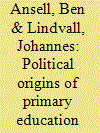

|
|
|
|
|
| Publication |
2013.
|
| Summary/Abstract |
This paper is concerned with the development of national primary education regimes in Europe, North America, Latin America, Oceania, and Japan between 1870 and 1939. We examine why school systems varied between countries and over time, concentrating on three institutional dimensions: centralization, secularization, and subsidization. There were two paths to centralization: through liberal and social democratic governments in democracies, or through fascist and conservative parties in autocracies. We find that the secularization of public school systems can be explained by path-dependent state-church relationships (countries with established national churches were less likely to have secularized education systems) but also by partisan politics. Finally, we find that the provision of public funding to private providers of education, especially to private religious schools, can be seen as a solution to religious conflict, since such institutions were most common in countries where Catholicism was a significant but not entirely dominant religion.
|
|
|
|
|
|
|
|
|
|
|
|
|
|
|
|
| 11 |
ID:
127789
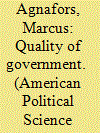

|
|
|
|
|
| Publication |
2013.
|
| Summary/Abstract |
Concepts such as "quality of government" and "good governance" refer to a desired character of the exercise of public authority. Recently the interest in good governance, the quality of government, and similar concepts has increased considerably. However, despite this increasing interest and use, an adequate definition of the concept of quality of government has proved difficult to find. This article criticizes recent attempts at such a definition and proposes an alternative, more complex definition that includes moral content and also encompasses a plurality of values and virtues at its core. An acceptable definition of the quality of governance must be consistent with the demands of a public ethos, the virtues of good decision making and reason giving, the rule of law, efficiency, stability, and a principle of beneficence. The article describes these components in detail and the relations among them.
|
|
|
|
|
|
|
|
|
|
|
|
|
|
|
|
| 12 |
ID:
127790
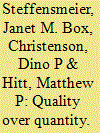

|
|
|
|
|
| Publication |
2014.
|
| Summary/Abstract |
Interest groups often make their preferences known on cases before the U.S. Supreme Court via amicus curiae briefs. In evaluating the case and related arguments, we posit that judges take into account more than just the number of supporters for the liberal and conservative positions. Specifically, judges' decisions may also reflect the relative power of the groups. We use network position to measure interest group power in U.S. Supreme Court cases from 1946 to 2001. We find that the effect of interest group power is minimal in times of heavily advantaged cases. However, when the two sides of a case are approximately equal in the number of briefs, such power is a valuable signal to judges. We also show that justice ideology moderates the effect of liberal interest group power. The results corroborate previous findings on the influence of amicus curiae briefs and add a nuanced understanding of the conditions under which the quality and reputation of interest groups matter, not just the quantity.
|
|
|
|
|
|
|
|
|
|
|
|
|
|
|
|
| 13 |
ID:
127804
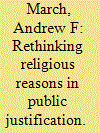

|
|
|
|
|
| Publication |
2013.
|
| Summary/Abstract |
This article intervenes in the debate on the place of religious arguments in public reason. I advance the debate not by asking whether something called "religious reasons" ought to be invoked in the justification of coercive laws, but by creating a typology of (a) different kinds and forms of religious arguments and, more importantly, (b) different areas of political and social life which coercive laws regulate or about which human political communities deliberate. Religious arguments are of many different kinds, are offered to others in a variety of ways, and the spheres of life about which communities deliberate pose distinct moral questions. Turning back to the public reason debate, I argue then that political liberals ought to be concerned primarily about the invocation of a certain subset of religious reasons in a certain subset of areas of human activity, but also that inclusivist arguments on behalf of religious contributions to public deliberation fail to justify the use of religious arguments in all areas of public deliberation.
|
|
|
|
|
|
|
|
|
|
|
|
|
|
|
|
| 14 |
ID:
127817
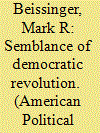

|
|
|
|
|
| Publication |
2013.
|
| Summary/Abstract |
Using two unusual surveys, this study analyzes participation in the 2004 Orange Revolution in Ukraine, comparing participants with revolution supporters, opponents, counter-revolutionaries, and the apathetic/inactive. As the analysis shows, most revolutionaries were weakly committed to the revolution's democratic master narrative, and the revolution's spectacular mobilizational success was largely due to its mobilization of cultural cleavages and symbolic capital to construct a negative coalition across diverse policy groupings. A contrast is drawn between urban civic revolutions like the Orange Revolution and protracted peasant revolutions. The strategies associated with these revolutionary models affect the roles of revolutionary organization and selective incentives and the character of revolutionary coalitions. As the comparison suggests, postrevolutionary instability may be built into urban civic revolutions due to their reliance on a rapidly convened negative coalition of hundreds of thousands, distinguished by fractured elites, lack of consensus over fundamental policy issues, and weak commitment to democratic ends.
|
|
|
|
|
|
|
|
|
|
|
|
|
|
|
|
|
|
|
|
|